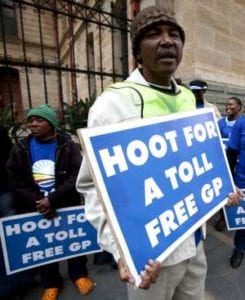The first order of business for the Constitutional Court today was to consider the application of the Road Freight Association (RFA) to join proceedings as an intervening party, with the bench taking almost no time to dismiss the motion.
While the RFA’s Adv Martin Brassey argued that their intervention at this stage of proceedings was critical as attempting to intervene in the High Court judicial review later this year would be too little too late. Brassey said: “(Should we intervene at a later stage)…the egg would be so scrambled that its unscrambling would be impossible. It is therefore desirable, the arguments that we ultimately seek to make should be placed before the court now”. National Treasury and the South African National Roads Agency Limited (Sanral) opposed the RFA’s application on the grounds that the association has come at the 11th hour. Treasury’s Adv Jeremy Gauntlett highlighted that the RFA should have intervened in the case when it was before the High Court in April already. Gauntlett said: “This application has come at the last possible stage. Already in the founding affidavit (from the April urgent interdict case), the RFA was specifically referred to by name as being an affected party. The RFA missed the bus when they knew about it.” After a brief adjournment to allow the bench of the ConCourt to deliberate on the merits and counter arguments, Chief Justice Moegeng Moegeng simply stated, “Having considered the arguments we make the following order that was supported by all my colleagues sitting . The application for leave to intervene has been dimissed with costs for two counsel members.” Almost immediately, Gauntlett got stuck into dealing with the merits of their application for leave to appeal the urgent interdict granted by the North Gauteng High Court on April 28.The interdict effectively halted the implementation of Sanral’s e-tolling system which has been postponed four times already since April 2011. Gauntlett believes that the presiding judge in the urgent interdict case, Judge Bill Prinsloo, granted the interdict based on simply, “ticking interim interdict boxes,” but that the reasons were illusive.
Gauntlett continued citing that Sanral was hemorrhaging financially every month that e-tolling is not implemented and that he believed it was “wholly unrealistic” to interdict a system that was ready to be implemented. The Opposition to Urban Tolling Alliance (Outa), through Adv Alistair Franklin will, however, argue the contrary, that Sanral was in no way ready to go live with e-tolling as certain regulatory issues were still outstanding days before April 30. Franklin is also expected to argue the merits of alternative funding models to e-tolling such as increasing the fuel levy to offset Sanral’s R21bn infrastructure debt. The case continues. michaela@thenewage.co.za
michaela@thenewage.co.za






